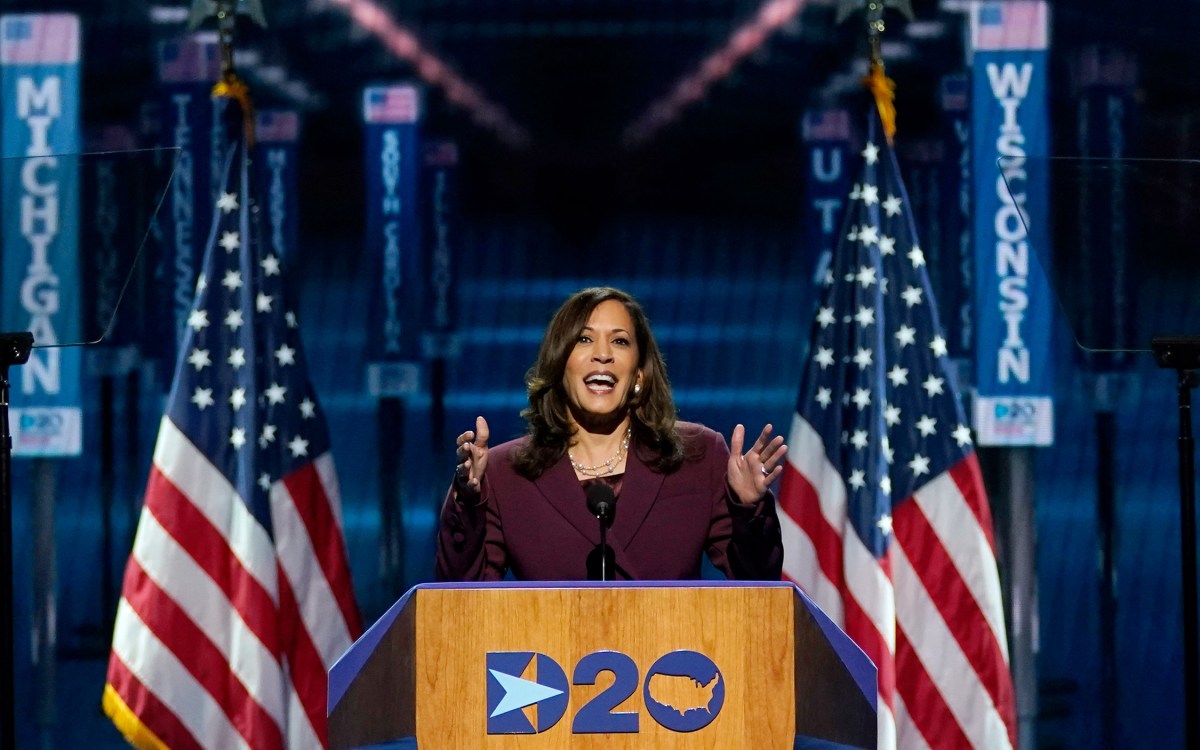
Washington Post political columnist Jennifer Rubin discusses the key role women played in the “resistance” to Donald Trump’s presidency.
Bill O’Leary/The Washington Post
How women led anti-Trump resistance
Jennifer Rubin points to rise in female candidates, political networks, despite systemic sexism, biased news coverage
Hillary Clinton’s loss in the 2016 election was a gut punch for millions who hoped to see a woman elected president and viewed winner Donald Trump as a serious threat to women’s rights. In a new book, “Resistance: How Women Saved Democracy from Donald Trump,” Washington Post columnist Jennifer Rubin says from the ashes arose a counterrevolution the likes of which the country hasn’t seen since the late 1960s. And it was mostly led by women, starting with the historic Women’s March a day after Trump’s 2017 inauguration.
A UC-Berkeley-trained labor lawyer, Rubin started writing about politics as a conservative around 2005. She broke from the Republican Party in 2016, saying it had become “warped by Trumpism.” An early and pugnacious member of the “Never Trump” camp, she voted for Clinton and Joe Biden in the last two elections.
Rubin spoke to the Gazette ahead of a virtual talk she will give on Oct. 7 at the Harvard Radcliffe Institute on “American Women and the Ongoing Battle to Save Democracy.” This interview has been edited for clarity and length.
Q&A
Jennifer Rubin
GAZETTE: What did women do during the Trump presidency that made the biggest difference?
RUBIN: Their contributions were on several levels. First, the women who ran in 2018 as Democrats clearly helped the House switch from Republican to Democratic control. A good deal of the book is about them, and how they won, and what they contributed after they won. Certainly, women running for president, not just one, made a difference and gave us our first female vice president. But the main contribution, above and beyond all that, is that women self-organized in a way that we had not seen in this country since the 1960s. Some were small networks that got candidates on the ballot, volunteered on campaigns, and made their voices heard, and some were like Indivisible, mostly staffed by women. Those organizations really made a huge difference. You can’t get electoral wins in 2017 in Virginia and Alabama, in 2018 in the midterms, and then in 2020, without a really strong increase in women’s participation, in women’s organization, and women running for office.
GAZETTE: Many women remain frustrated at the sexism that permeates news coverage of women in politics. You point to the commentary about then-Sen. Harris’ presidential candidacy and later, her “suitability” as a potential VP pick, as a glaring example. And it wasn’t always men — some women journalists were guilty of this, too. Why hasn’t the press done a better job rooting this out?
RUBIN: It is not only men who have a certain perspective about what politics looks like and what politicians should be like. A good deal of it is very subconscious. There’s a certain laziness, a certain unconscious bias, that organizations have to do a much better job of policing. Most reporters and most editors are still male. That’s not an excuse; it’s a statement of fact. Every organization can benefit by looking at how they use language, what the standards are. And it’s not only a problem of left versus right. Look at the treatment that Elizabeth Warren got at the hands of the so-called Bernie Bros. And this all took place in the most misogynistic, toxic atmosphere in which the president of the United States was essentially saying, “Men who are accused of sexual assault are victims.” The whole environment was so antagonistic towards women.
I have a very long section on the issues of likability and electability that were thrown at Elizabeth Warren and Kamala Harris in a way they never were for men. Warren gave a wonderful interview to Rachel Maddow where she was asked about the sexism, and she said, “If I say there is, then I’m a whiner, and if I say there isn’t, women look at me like I have two heads.” So it is a very difficult problem. It has always been. Then you introduce the issue of race, with Kamala Harris, it became that much more powerful. The process of selecting a VP surfaced a whole set of expectations and frames for what a woman candidate should be like, what a woman of color should be like, and the whole issue of whether she was too ambitious, too aggressive, was somewhat mind-blowing, since these are people who were competing for the presidency of the United States. No one would have asked any male candidate, “Why are you being so aggressive and nasty to poor Joe Biden?”
GAZETTE: You’ve been very critical of events since the 2020 election, particularly how the Republican Party has gone along with Trump and his acolytes as they have convinced most Republican voters that Biden was not legitimately elected. Hundreds of new laws have been enacted in Republican-led states that critics say will sharply limit voting. And Trump, who reportedly mulled over a memo outlining steps to subvert the election just days before the Jan. 6 certification of Biden’s victory, appears poised to run again in 2024. Are the Democrats meeting the moment we are in?
RUBIN: Democrats tend to be less aggressive and less sharp in their messaging. Part of that is a function of the fact that Joe Biden came into office wanting to be bipartisan. I could understand then, a senator or White House staff being a little timid about going after Republicans at the same time they’re trying to get votes for their economic agenda. That was a mistake. They would have gotten those votes on infrastructure without being nice, and they weren’t going to get their votes on anything else, anyway, so from the get-go, they could have been more sharp, more directed, more specific.
There are three other factors: One, the Democrats have not done a good job at the state and local level. This was a problem that began under Obama and has continued to get worse. There’s such emphasis on the presidential race, understandably, and on congressional races. State legislatures are controlled by Republicans because Democrats have very poor organization in the 50 states. That has now come back to bite them.
The second factor is the Supreme Court. For decades, women and minorities have relied on the court as the ultimate backstop for protection of fundamental rights like voting or abortion. And you now have people on the court who are essentially partisan hacks, enacting the policy objectives, the policy outcomes, of the party of the president who nominated them. That’s not a good solution when you have a court that has been intellectually corrupted, and you have state legislatures who are overwhelmingly Republican. You’re getting down to the point where you have very few tools.
That brings us to the third problem, which is the Senate. The question, as we’re having this conversation, is whether they’re going to allow the filibuster, a Senate rule that is not in the Constitution, that has traditionally been used to oppose Civil Rights legislation, to allow this anti-democratic putsch (in the 1930s sense of the word) to take over the country and impede democracy? I find it hard to believe, though it’s certainly possible, that they would let the moment slip through their hands. That would be a grave, grave error.
One of the things that tends to impede Democrats is they think if they hold to the rules now, when the Republicans come back in power they’ll have to hold to the rules, too. And we’ve seen again and again that is not the case. So some of these frames, and some of these habits, are not well-suited for combating the Republican Party of 2021. I think it’s going to be up to people in the grassroots; it’s going to be up to civil rights organizations, up to many others, to flex their muscles and get the White House fully engaged on this issue.
GAZETTE: Since 2016, the Republican Party has jettisoned many long-held position on issues like trade, national security, foreign policy, and deficit spending. How did this happen so swiftly?
RUBIN: There’s not one explanation. There are certainly people who are so cynical, they don’t believe in anything. Whatever they were mouthing before, they didn’t really believe in or didn’t believe in strongly, so they could just throw all that overboard. There’s another category of people who are careerists, who want access, who want jobs, who want to be in the know, who crave to be at the center of power, and they simply made a deal with the devil to get there. And there is a third group who have become so convinced that Democrats are the center of all evil in the universe, that whatever Trump does, whatever the Republican party does, at least it’s better than those Democrats, who are somehow alien to America. A lot of this goes to race, and to some extent, to gender. They want to preserve a Western civilization; they want to protect America as they know it. They cannot let the Democrats take over. A great deal is racist recoiling at the notion that whites are no longer in complete political and economic control.
GAZETTE: Many Republican voters who did not like Trump’s leadership voted for Biden in 2020. Now, as the party moves even further to the right, what happens to these voters? Where do they go politically?
RUBIN: This is the discussion these days. There is a whole group of people, whether they consider themselves to be Independents or conservative Democrats, who see that the immediate need of the country is the same as it was before the election — it is securing democracy; it is preventing the erosion of democratic norms and the rule of law.
Whether they consider themselves to be members or simply allies, it is in the country’s interest to back the one party we have right now that at least believes in small-d democracy. And so that’s where many of us have landed. It doesn’t prevent us from criticizing, as we did before, either the administration or Congress. But it does reorient our priorities. That above any other policy disagreement we might have, whether it’s the amount of spending, the top marginal tax rate, or any other issue, democracy has to be paramount, and the survival of a multiracial, inclusive democracy.
Part of what I write about in the book is that, for me, it was very unfortunate that the 2020 results were so mixed because Republicans never got the message that they had to change their ways. They came away thinking, “We’re pretty much on track. This is going great. We just have to get someone maybe a little less crazy than Trump.” As opposed to rethinking their entire descent into this MAGA moment and MAGA philosophy. So I think it takes big losses, I think it takes repetitive losses, before there’s any impetus for change.







